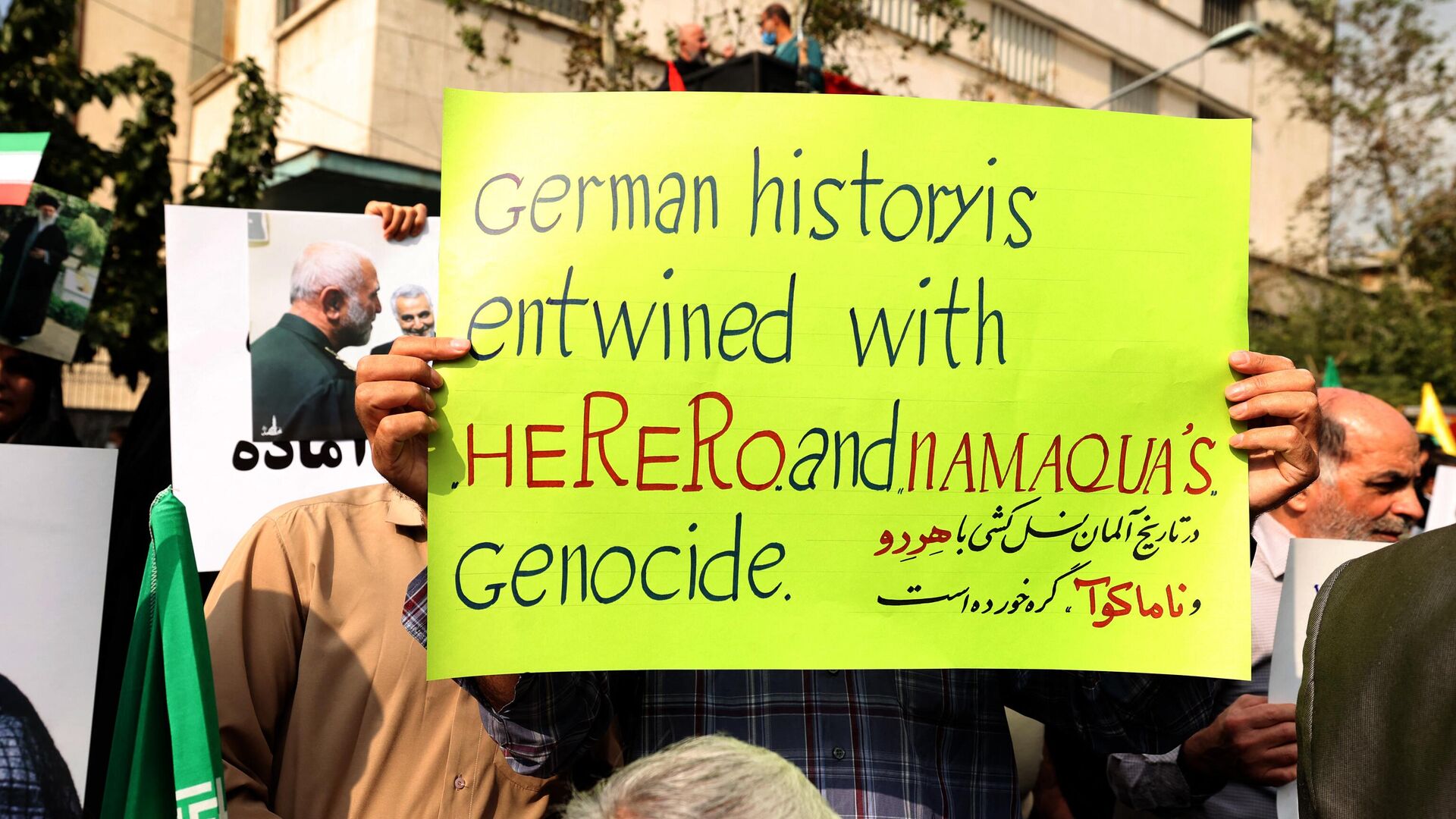https://en.sputniknews.africa/20240308/namibian-communities-reportedly-seek-restoration-of-land-in-dispute-over-legacy-of-german-1065452225.html
Namibian Communities Reportedly Seek Restoration of Land in Dispute Over Legacy of German Atrocities
Namibian Communities Reportedly Seek Restoration of Land in Dispute Over Legacy of German Atrocities
Sputnik Africa
Germany committed heinous atrocities in Africa at the turn of the 20th century, eradicating nearly 80% of the Herero and half of the Nama populations in the... 08.03.2024, Sputnik Africa
2024-03-08T15:05+0100
2024-03-08T15:05+0100
2024-03-08T15:13+0100
namibia
sub-saharan africa
germany
international court of justice (icj)
southern africa
genocide
colonialism
israeli-palestinian conflict
crime
https://cdn1.img.sputniknews.africa/img/07e8/03/08/1065453766_0:160:3072:1888_1920x0_80_0_0_add2c24209606c62b2811cfc44421a4a.jpg
Communities in Namibia who have been denied their property for over a century, and whose forebears were slaughtered by German colonial forces, are demanding that Berlin hold new negotiations to administer the restitution of ancestral lands, the Western media reported on Thursday.In May 2021, Germany committed to financing projects worth 1.1 billion euros over a span of 30 years as reparations for the confiscation of properties and deaths carried out by German colonial forces from 1904 to 1908, following the tribes' uprising against German colonial governance.Germany issued an official apology for its involvement in the killing of around 65,000 Herero and 10,000 Nama people, acknowledging it as genocide for the first time.However, some argue that Germany's apology should not have been addressed towards the Namibian state, as the latter did not exist during the time of the genocide and lacked the right to represent the traditional Herero and Nama authorities in negotiations with Germany, according to the report.Mutjinde Katjiua, the head of a faction of the Ovaherero Traditional Authority, reportedly said that the decision to exclude descendants of the affected communities from the negotiations contradicted a 2006 legislative decision, which stipulated that negotiations should involve the aforementioned groups and the government responsible for the atrocities.Furthermore, the communities claimed that the 2021 joint declaration failed to address the matter of land ownership, recalling the unreturned ancestral property seized by German forces, the media revealed.The land is the only thing the communities can get if things don't work out, he reportedly added.According to Harald Hecht, head of the Forum of German-speaking Namibians, the joint declaration is currently being discussed by the two governments to make amendments before it can be ratified by the Namibian parliament. As a result, the ratification process has been put on hold, the report said.The suggested revisions reportedly involve shortening the duration of the agreement from 30 years to either five or 10 years.Ambassador Tonateni Intenge-Envula, who leads Namibia's technical committee on genocide, told the media that all parties affected by the issue were invited to participate in the negotiations.In the early 20th century, Germany carried out a brutal campaign in its colony of South West Africa (now Namibia), resulting in the extermination of nearly 80% of the Herero people and half of the Nama. This violent act was motivated by Germany's desire to control the land, as the Herero and Nama resisted the German occupation and fought to defend their territory.This dark page of Germany drew criticism to the country when it backed Israel in South Africa's genocide lawsuit at the International Court of Justice as it contradicts its historical obligation for the murder of the Herero and Nama people in Namibia, Katjiua told Sputnik Africa in January.
https://en.sputniknews.africa/20240120/germanys-backing-of-israel-contradicts-its-genocide-history-in-namibia-herero-traditional-leader-1064708020.html
namibia
germany
southern africa
Sputnik Africa
feedback@sputniknews.com
+74956456601
MIA „Rossiya Segodnya“
2024
Christina Glazkova
https://cdn1.img.sputniknews.africa/img/07e7/0b/07/1063380906_0:0:673:674_100x100_80_0_0_79628b4d0cd9f29291a57aa13bbf9e7a.jpg
Christina Glazkova
https://cdn1.img.sputniknews.africa/img/07e7/0b/07/1063380906_0:0:673:674_100x100_80_0_0_79628b4d0cd9f29291a57aa13bbf9e7a.jpg
News
en_EN
Sputnik Africa
feedback@sputniknews.com
+74956456601
MIA „Rossiya Segodnya“
Sputnik Africa
feedback@sputniknews.com
+74956456601
MIA „Rossiya Segodnya“
Christina Glazkova
https://cdn1.img.sputniknews.africa/img/07e7/0b/07/1063380906_0:0:673:674_100x100_80_0_0_79628b4d0cd9f29291a57aa13bbf9e7a.jpg
namibia, germany, international court of justice (icj), southern africa, genocide, colonialism, israeli-palestinian conflict, crime
namibia, germany, international court of justice (icj), southern africa, genocide, colonialism, israeli-palestinian conflict, crime
Namibian Communities Reportedly Seek Restoration of Land in Dispute Over Legacy of German Atrocities
15:05 08.03.2024 (Updated: 15:13 08.03.2024) Christina Glazkova
Writer / Editor
Germany committed heinous atrocities in Africa at the turn of the 20th century, eradicating nearly 80% of the Herero and half of the Nama populations in the area that is now Namibia. As a result, these two peoples now constitute a minority in the modern-day African country.
Communities in Namibia who have been denied their property for over a century, and whose forebears were slaughtered by
German colonial forces, are demanding that Berlin hold new negotiations to administer the restitution of ancestral lands, the Western media reported on Thursday.
In May 2021,
Germany committed to financing projects worth 1.1 billion euros over a span of 30 years as reparations for the confiscation of properties and deaths carried out by German colonial forces from 1904 to 1908, following the tribes' uprising against German colonial governance.
Germany issued an official apology for its involvement in the killing of around 65,000 Herero and 10,000 Nama people, acknowledging it as genocide for the first time.
However, some argue that Germany's apology should not have been addressed towards the Namibian state, as the latter did not exist during the time of the genocide and lacked the right to represent the traditional Herero and
Nama authorities in negotiations with Germany, according to the report.
Mutjinde Katjiua, the head of a faction of the Ovaherero Traditional Authority, reportedly said that the decision to exclude descendants of the affected communities from the
negotiations contradicted a 2006 legislative decision, which stipulated that negotiations should involve the aforementioned groups and the government responsible for the atrocities.
Furthermore, the communities claimed that the 2021 joint declaration failed to address the matter of land ownership, recalling the unreturned ancestral property seized by German forces, the media revealed.
"What we have now is a bilateral agreement to fund development aid. It's not even reparations and something to do with genocide," Katjiua told the Western media. "Germany must come to the table, discuss with us, negotiate with Hereros and Namas, and together we agree on what is appropriate to repair the damage [caused]."
The land is the only thing the communities can get if things don't work out, he reportedly added.
According to Harald Hecht, head of the Forum of German-speaking Namibians, the joint declaration is currently being discussed by the two governments to make amendments before it can be ratified by the Namibian parliament. As a result, the ratification process has been put on hold, the report said.
The suggested revisions reportedly involve shortening the duration of the agreement from 30 years to either five or 10 years.
Ambassador Tonateni Intenge-Envula, who leads
Namibia's technical committee on genocide, told the media that all parties affected by the issue were invited to participate in the negotiations.
In the early 20th century, Germany carried out a brutal campaign in its colony of South West Africa (now Namibia), resulting in the extermination of nearly 80% of the Herero people and half of the Nama. This violent act was motivated by Germany's desire to control the land, as the Herero and Nama resisted the German occupation and fought to defend their territory.
This dark page of Germany drew criticism to the country when it backed Israel in
South Africa's genocide lawsuit at the International Court of Justice as it contradicts its historical obligation for the murder of the Herero and Nama people in Namibia, Katjiua told
Sputnik Africa in January.



